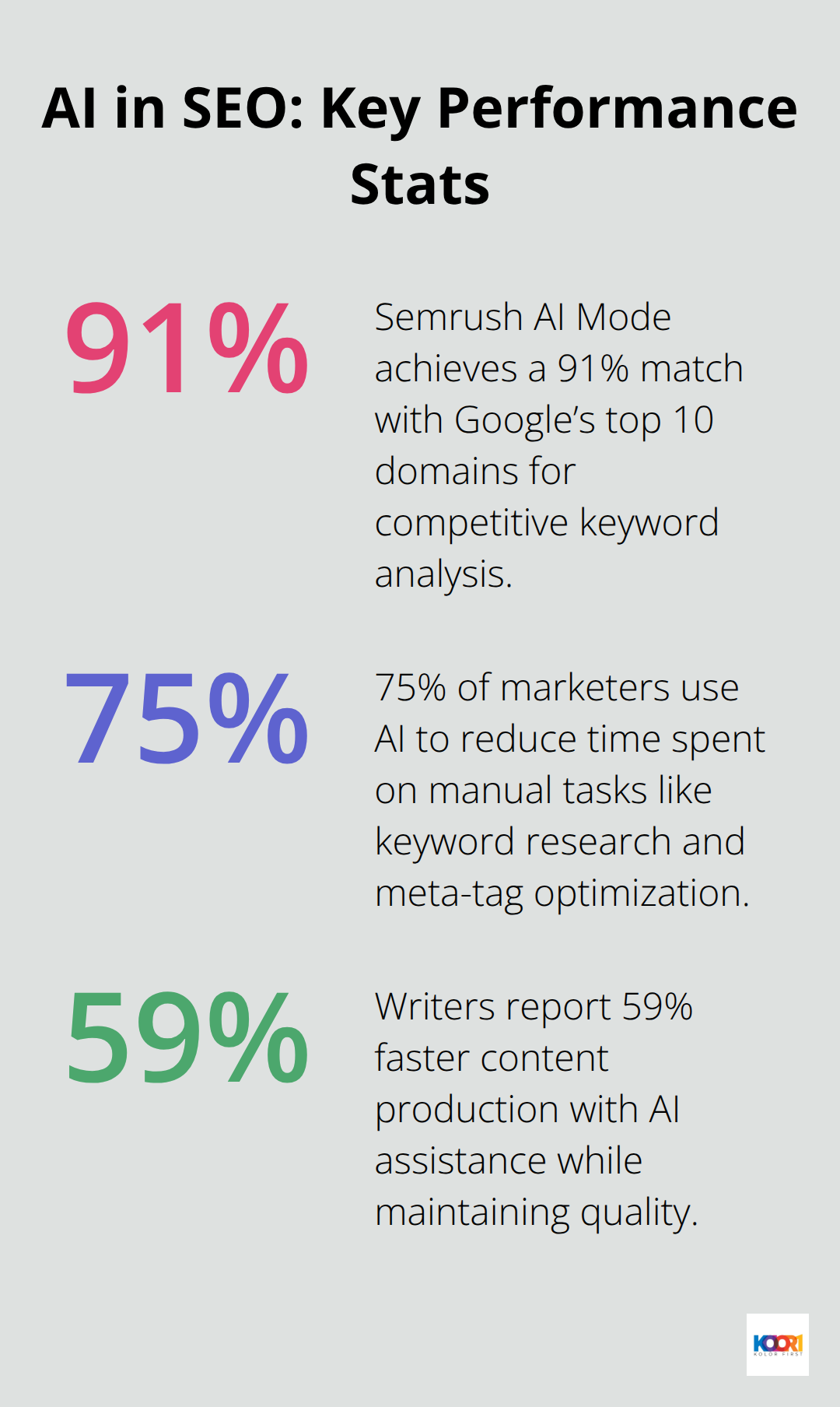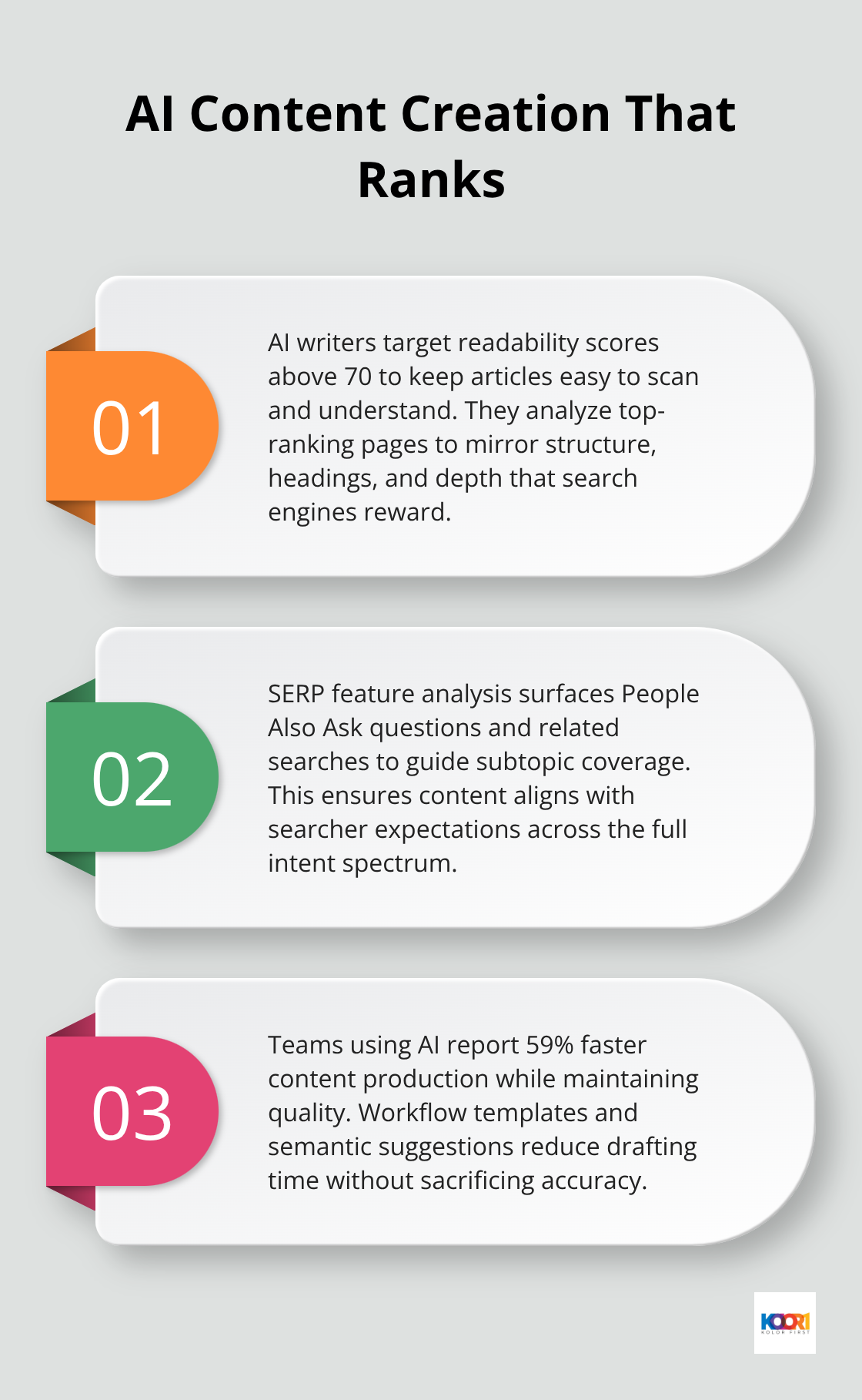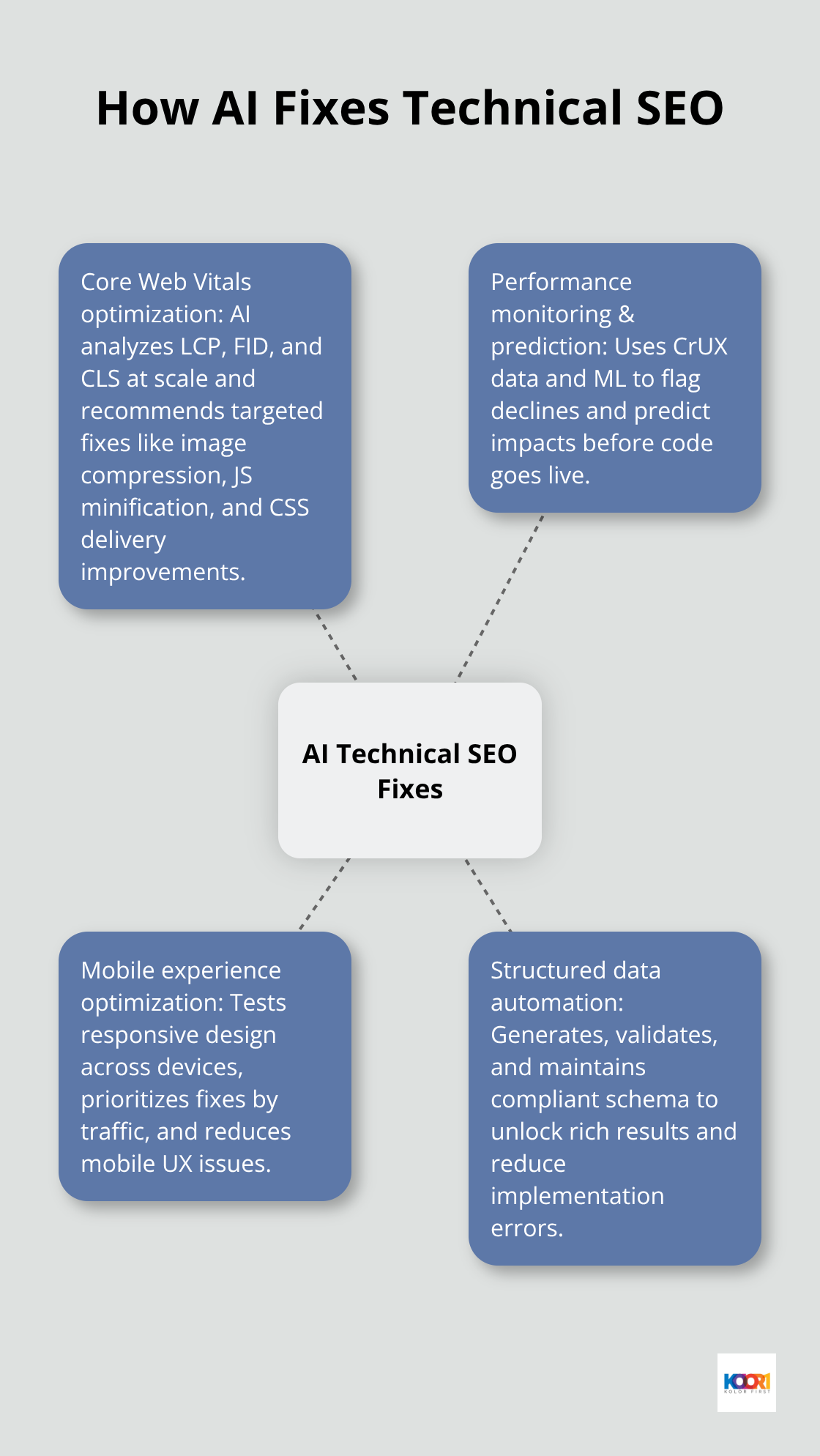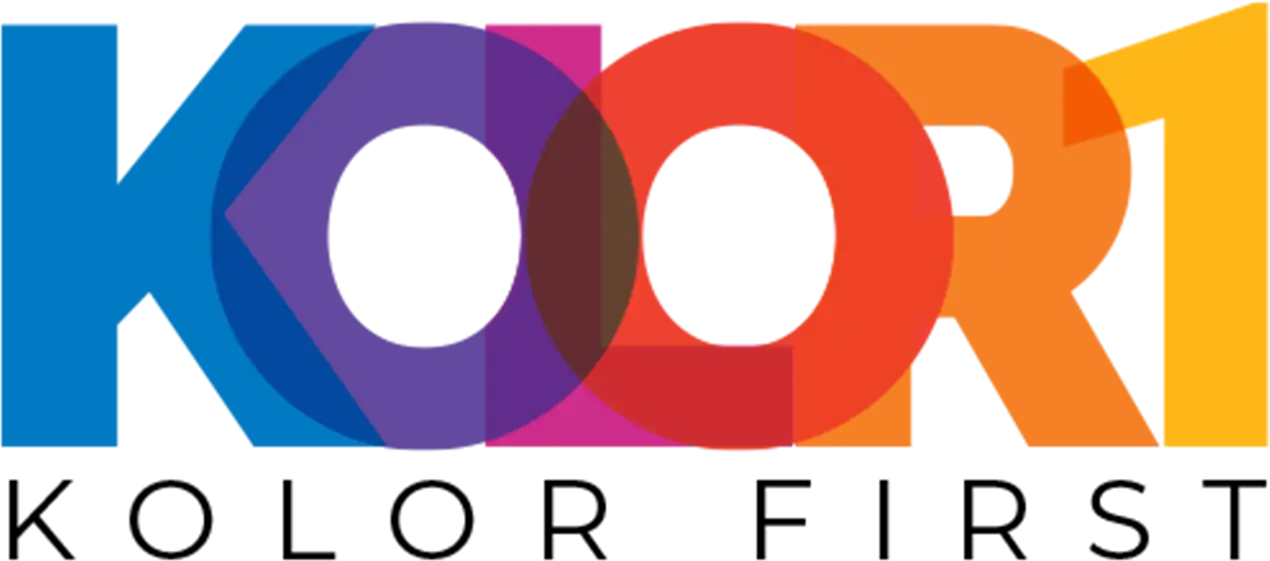SEO artificial intelligence transforms how businesses approach search optimization. Modern AI tools analyze millions of data points in seconds, identifying opportunities that manual research would miss.
We at Kolorfirst LLC see companies achieving 40% faster ranking improvements when they integrate AI into their SEO workflows. Smart automation handles technical audits, content optimization, and competitive analysis with precision that surpasses traditional methods.
What AI Tools Transform SEO Research
Keyword Research Revolution
Semrush AI Mode achieves a 91% match with Google’s top 10 domains, which makes it the most accurate tool for competitive keyword analysis. The platform processes search intent patterns and identifies long-tail opportunities that traditional research methods miss. Ahrefs integrates machine learning algorithms to predict keyword difficulty scores based on real-time competition data, while Surfer SEO’s Content Editor analyzes top-ranking pages to suggest semantic keywords that boost topical authority.
Modern AI tools like SE Ranking automatically cluster related keywords into content themes, which reduces research time as 75% of marketers leverage AI to reduce the time spent on manual tasks like keyword research and meta-tag optimization. These platforms examine user behavior signals and search patterns to recommend keywords with high conversion potential rather than just search volume.

Content Gap Analysis at Scale
AI-powered content analysis tools identify knowledge gaps when they compare your website against competitor content structures. Tools like Rankability’s Content Monitor track content relevance in real-time and alert you when competitors publish content that targets your keywords. ChatGPT and Claude analyze existing competitor material to suggest uncovered aspects and topic angles that capture additional search demand.
Content gap analysis through AI reveals underused keywords and guides content refinement strategies that improve search rankings. These tools process thousands of competitor pages simultaneously and identify opportunities that manual analysis would take weeks to uncover.
Technical SEO Automation
AI conducts comprehensive technical SEO audits faster than any manual process can achieve. Automated tools identify broken links, poor site architecture, and crawling issues while they suggest specific fixes. Indexly helps solve common problems like pages marked as crawled but not indexed (addressing technical barriers that prevent content from ranking).
Technical auditing AI evaluates website structures and suggests relevant internal linking opportunities, which creates natural backlink ecosystems that enhance domain authority. These tools assess page loading speeds, mobile responsiveness, and Core Web Vitals metrics while they provide actionable recommendations that directly impact search performance.
Predictive Analytics and Trend Forecasting
AI-powered predictive analytics forecast shifts in user behavior and help marketers create timely content that captures future search demand. These tools analyze historical search data patterns and identify emerging trends before competitors notice them. Machine learning algorithms process seasonal fluctuations, industry changes, and user preference shifts to recommend content topics with high future potential.
Predictive SEO tools examine search query evolution and suggest content strategies that align with anticipated algorithm updates. This forward-thinking approach positions websites to capture traffic from trending topics and seasonal opportunities (giving businesses a competitive advantage in content planning).
These advanced research capabilities set the foundation for AI-powered content creation that transforms how businesses approach search optimization.
How AI Transforms Content Creation for SEO
Smart Content Generation That Ranks
AI content generation tools like Koala AI and Jasper create SEO-optimized articles that match search intent while they maintain readability scores above 70. These platforms analyze top-ranked pages for target keywords and generate content structures that mirror successful competitors. Natural Language Processing algorithms examine semantic relationships between keywords and suggest related terms that boost topical authority without keyword stuffing.
ChatGPT and Claude generate content outlines based on search intent analysis, which allows writers to create comprehensive articles that address user questions systematically. Content creation AI processes SERP features like People Also Ask boxes and related searches to identify subtopics that search engines expect in high-ranked content. Writers who use AI assistance report 59% faster content production while they maintain quality standards that satisfy both users and search algorithms.

Search Intent Optimization Through Machine Learning
AI optimization tools analyze user behavior signals to determine whether content matches search intent patterns. Surfer SEO’s Content Editor examines click-through rates, bounce rates, and time-on-page metrics from top-ranked pages to suggest content improvements that align with user expectations. These tools identify semantic keywords and LSI terms that search engines associate with specific topics (which creates content that demonstrates topical expertise).
Rankability’s real-time optimization features track content performance and suggest adjustments when positions decline. The platform analyzes search query variations and recommends content updates that capture additional long-tail traffic. Content optimization AI evaluates readability scores, sentence structure, and paragraph length to match user preferences while it maintains search engine compatibility.
Automated Meta Elements That Drive Clicks
AI tools generate meta descriptions and title tags that achieve higher click-through rates than manual creation methods. These platforms analyze successful meta elements from top-ranked pages and create variations that incorporate target keywords naturally while they stay within character limits. Title tag generators test multiple variations and predict CTR performance based on emotional triggers, power words, and keyword placement patterns.
Meta description AI examines search query context to create snippets that answer user questions directly. Tools like Copy.ai and Writesonic generate multiple meta variations for A/B tests (which allows marketers to identify the most effective combinations for specific keywords). Automated meta creation saves hours of manual work while it consistently produces elements that meet search engine guidelines and user expectations.
These content optimization capabilities work hand-in-hand with technical SEO improvements that enhance overall site performance and user experience.
How AI Fixes Technical SEO Problems
Core Web Vitals Performance Through Machine Learning
AI-powered performance tools automatically identify and fix Core Web Vitals issues that damage search rankings. Google PageSpeed Insights API integration with tools like GTmetrix and Pingdom allows AI systems to analyze Largest Contentful Paint, First Input Delay, and Cumulative Layout Shift metrics across thousands of pages simultaneously. These platforms recommend specific optimizations like image compression ratios, JavaScript minification sequences, and CSS delivery methods that improve site speeds within weeks.

Performance monitoring AI tracks real user metrics through Chrome User Experience Report data and alerts webmasters when Core Web Vitals scores decline. Tools like WebPageTest integrate machine learning algorithms that predict performance impacts before code changes go live, which prevents technical issues that harm search visibility. Site speed optimization through AI eliminates manual testing cycles and provides specific recommendations that directly improve search engine rankings.
Mobile Experience Optimization at Scale
Mobile optimization AI tools test responsive design elements across hundreds of device configurations automatically. Google Mobile-Friendly Test API powers advanced testing platforms that identify layout shifts, touch target sizing issues, and viewport problems that affect mobile search performance. These systems generate device-specific recommendations and prioritize fixes based on traffic volume from different mobile devices.
Responsive design testing through AI evaluates user interaction patterns on mobile devices and suggests interface improvements that reduce bounce rates. Tools like BrowserStack integrate AI analysis that identifies mobile usability issues across different operating systems and screen sizes (which manual testing cannot achieve at scale). Mobile optimization AI processes user behavior data to recommend design changes that improve engagement metrics and search rankings simultaneously.
Structured Data Implementation Through Automation
Schema markup AI generates and validates structured data codes that enhance search result appearances. These tools analyze website data and generate appropriate schema types for products, articles, events, and local businesses while saving time and reducing errors. These platforms maintain markup accuracy and compliance with Google structured data guidelines while they reduce implementation errors that prevent rich snippets from appearing.
Structured data automation identifies opportunities for enhanced search features like FAQ boxes, review stars, and product information panels (which increase click-through rates from search results). AI tools monitor schema performance and suggest markup improvements that boost visibility in search features. Automated structured data implementation saves development time while it consistently produces valid markup that search engines can process effectively.
Final Thoughts
SEO artificial intelligence delivers measurable results that transform search performance. Companies that integrate AI tools report 40% faster ranking improvements and significant time savings across keyword research, content creation, and technical optimization tasks. The combination of automated audits, predictive analytics, and smart content generation creates competitive advantages that manual methods cannot match.
Implementation success requires the right tool combinations. Semrush and Ahrefs handle keyword research and competitive analysis, while Surfer SEO and Rankability optimize content for search intent. Technical SEO benefits from automated audit tools that identify Core Web Vitals issues and structured data opportunities (these platforms work together to create comprehensive optimization workflows that scale with business growth).
The future points toward even more sophisticated AI integration. Search engines continue to evolve their algorithms to prioritize user experience and content quality over traditional ranking factors. We at Kolorfirst LLC help businesses implement these advanced SEO strategies through our comprehensive digital marketing solutions.






